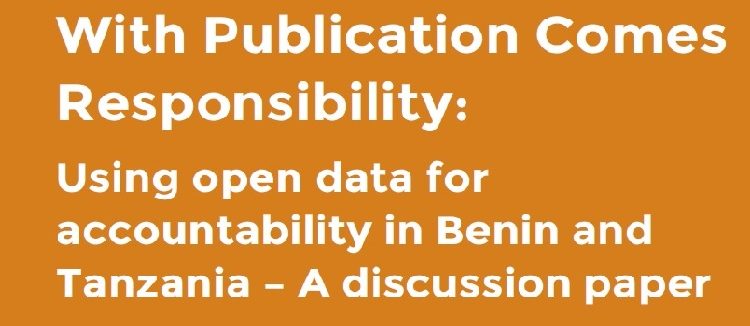This post was originally published on the Open Data Charter website, written by Elise Dufief, Research and Monitoring Manager at Publish What You Fund
The government of Tanzania announced in August that it was withdrawing from the Open Government Partnership (OGP) process. This was seen as a dramatic turn of events by some as the previous administration was regarded as a champion of transparency reforms. For others, it highlighted some of the challenges of international transparency initiatives and potentially offered an opportunity to reflect on how these initiatives could better respond to domestic issues and put citizens’ needs at their heart.
Earlier this year, I travelled to Tanzania and Benin and conducted interviews with representatives from government, donors and civil society organisations to investigate some of these issues. I looked into the opportunities and barriers for open aid data to be used as an accountability mechanism for partner country citizens. We at Publish What You Fund published a discussion paper earlier this month detailing the findings of our work.
Publish What You Fund, among other organisations, has argued that the public disclosure of information on development activities by major donors is an essential and necessary step to increase aid effectiveness. Substantial progress has been made at the international level through initiatives such as IATI and individual efforts of some major donors and governments to publish more and better quality development data. However, transparency alone is not sufficient as this information also needs to be used to promote accountability to local actors and respond to citizens’ needs.
We are also not the only ones reflecting on this. Organisations such as Oxfam and Open Contracting are also trying to find a constructive and collaborative way to move the transparency agenda forward and shed light on the necessary conditions for data to be used for accountability.
The new framework developed by Liz Carolan of the Open Data Charter, alongside the Transparency and Accountability Initiative, also helped shape our thinking on the matter. That study found 5 steps connecting open data and accountability: data production, sharing and processing, use and action. We proposed two additions to it: an initial step of identifying information needs and mapping potential users; and to also implement feedback mechanisms once data is made available to create a circular and iterative process from transparency to accountability.
Additionally, five key findings emerged from the interviews conducted in Benin and Tanzania:
1.There is a clear and repeated need for more high quality information on aid and development finance.
This was articulated clearly by donor country offices, government representatives and civil society organisations. Recent efforts to provide more information should be sustained and respond to these needs where possible.
2. International donor-led initiatives are not yet meeting country-level needs.
Tanzania’s withdrawal from the OGP is a manifestation of this. More attention needs to be paid to the national context and dynamics at play between different actors. This would help to identify where and how transparency and open data can help to improve development outcomes and accountability to citizens.
3. Both the development and data landscapes are fragmented and this is increasing.
The international development landscape increasingly involves more actors, more diverse flows and varied interests and objectives. In the absence of effective coordination, this complexity is reflected on the governance of data at country-level, also impeding its potential users.
4. A lack of trust in open data and its applications impedes its use as an accountability tool.
Data accuracy issues aside, examples from Tanzania and Benin demonstrated that more openness and transparency is sometimes met with fear of criticism and misinterpretation of the data. These are serious concerns that should be addressed. Shrinking civil society space and legislative restrictions to the access and use of this information, however, do not appear as viable solutions; they rather contradict the stated aim of the open data agenda.
5. With publication comes responsibility.
All actors have a responsibility to go beyond mere publication to make data truly accessible, usable and used. This requires putting people at the heart of transparency initiatives. It is only by working towards the identification of their needs, understanding their concerns and actively seeking their feedback that adequate responses and meaningful change will be implemented at country level. Data alone does not bring change. People do.
You can read our discussion paper ‘With Publication Brings Responsibility: Using open data for accountability in Benin and Tanzania’ here.
